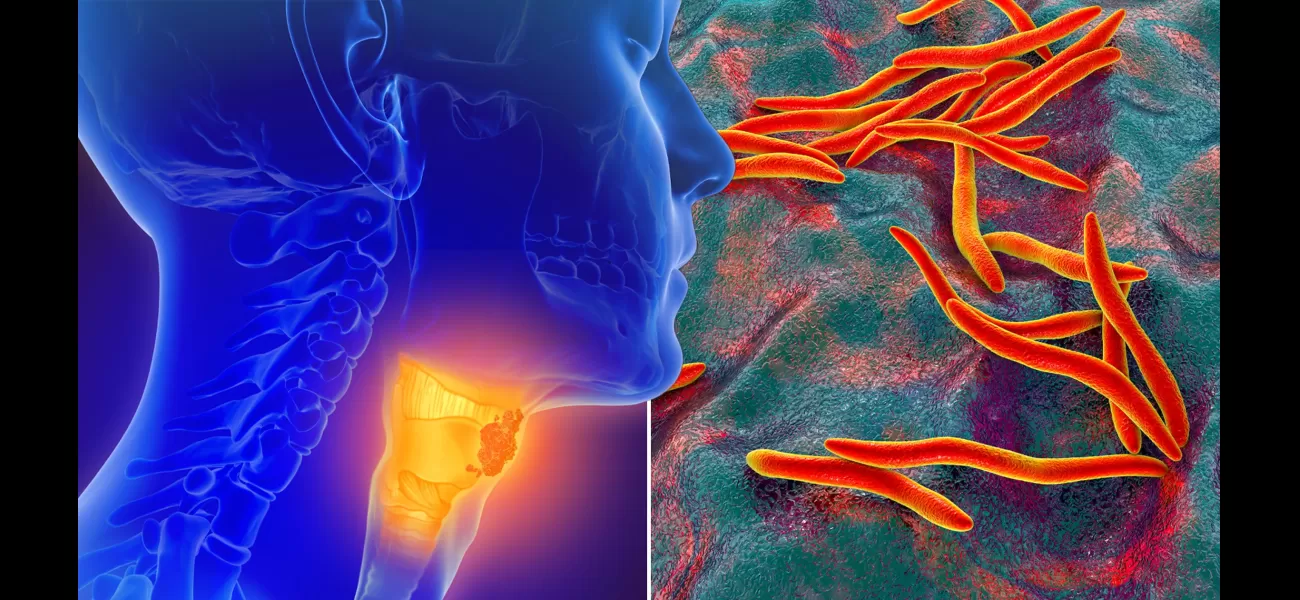Researchers find bacteria that destroys nearly all cancer cells.
Bacteria's potential: 99% fatality for specific cancer cells.
July 27th 2024.

According to a recent study, scientists have discovered that Fusobacterium, a common bacteria found in the mouth, has the ability to effectively eliminate certain types of cancer cells in the neck and head. This groundbreaking research has shown that this bacteria can cause these cancer cells to "melt" away, providing patients with a much-improved chance of survival.
What makes this discovery even more surprising is that Fusobacterium is typically associated with gum disease and plaque buildup in the mouth. The study, conducted by researchers at Guy's and St Thomas' and King's College London, initially began with a modeling process to identify potentially interesting bacteria for further investigation. Once Fusobacterium was identified, the scientists placed it in Petri dishes with cancer cells and left them for several days.
When they returned, they were amazed to find that the cancer cells had almost completely disappeared. This was a major surprise, as Fusobacterium has previously been linked to the progression of bowel cancer. The team also analyzed data from 155 patients with head and neck cancer and found that those who had Fusobacterium in their tumors had a significantly higher chance of survival compared to those without the bacteria.
This discovery has the potential to greatly impact treatment for patients with head and neck cancer, which includes cancers of the mouth, throat, voice box, nose, and sinuses. It is particularly exciting as there have been few therapeutic advancements in this type of cancer over the past two decades.
Dr. Miguel Reis Ferreira, lead author of the study, shared his thoughts on the surprising results, stating, "This research reveals that these bacteria have a more complex role in their relationship with cancer than previously thought. They essentially have the ability to 'melt' head and neck cancer cells." Dr. Ferreira, who is also a consultant in head and neck cancer, explained that the team initially expected Fusobacterium to promote the growth of cancer cells or make them more resistant to radiotherapy. However, they were amazed to find that the bacteria actually destroyed the cancer cells completely within a matter of days.
The study's findings were further validated by a team in Italy, who reported similar results. Dr. Ferreira believes that this discovery could have significant implications for treatment, as the presence of Fusobacterium in tumors may be used to predict patient outcomes. This could lead to more tailored and effective treatment plans for individuals based on the likelihood of their cancer returning.
This groundbreaking research has been published in the journal Cancer Communications, where the scientists have described Fusobacterium as being "toxic" to head and neck cancer and potentially playing a role in determining a patient's prognosis. Overall, this discovery has the potential to greatly improve the outcomes for patients with head and neck cancer and could pave the way for more targeted and effective treatments in the future.
What makes this discovery even more surprising is that Fusobacterium is typically associated with gum disease and plaque buildup in the mouth. The study, conducted by researchers at Guy's and St Thomas' and King's College London, initially began with a modeling process to identify potentially interesting bacteria for further investigation. Once Fusobacterium was identified, the scientists placed it in Petri dishes with cancer cells and left them for several days.
When they returned, they were amazed to find that the cancer cells had almost completely disappeared. This was a major surprise, as Fusobacterium has previously been linked to the progression of bowel cancer. The team also analyzed data from 155 patients with head and neck cancer and found that those who had Fusobacterium in their tumors had a significantly higher chance of survival compared to those without the bacteria.
This discovery has the potential to greatly impact treatment for patients with head and neck cancer, which includes cancers of the mouth, throat, voice box, nose, and sinuses. It is particularly exciting as there have been few therapeutic advancements in this type of cancer over the past two decades.
Dr. Miguel Reis Ferreira, lead author of the study, shared his thoughts on the surprising results, stating, "This research reveals that these bacteria have a more complex role in their relationship with cancer than previously thought. They essentially have the ability to 'melt' head and neck cancer cells." Dr. Ferreira, who is also a consultant in head and neck cancer, explained that the team initially expected Fusobacterium to promote the growth of cancer cells or make them more resistant to radiotherapy. However, they were amazed to find that the bacteria actually destroyed the cancer cells completely within a matter of days.
The study's findings were further validated by a team in Italy, who reported similar results. Dr. Ferreira believes that this discovery could have significant implications for treatment, as the presence of Fusobacterium in tumors may be used to predict patient outcomes. This could lead to more tailored and effective treatment plans for individuals based on the likelihood of their cancer returning.
This groundbreaking research has been published in the journal Cancer Communications, where the scientists have described Fusobacterium as being "toxic" to head and neck cancer and potentially playing a role in determining a patient's prognosis. Overall, this discovery has the potential to greatly improve the outcomes for patients with head and neck cancer and could pave the way for more targeted and effective treatments in the future.
[This article has been trending online recently and has been generated with AI. Your feed is customized.]
[Generative AI is experimental.]
0
0
Submit Comment





